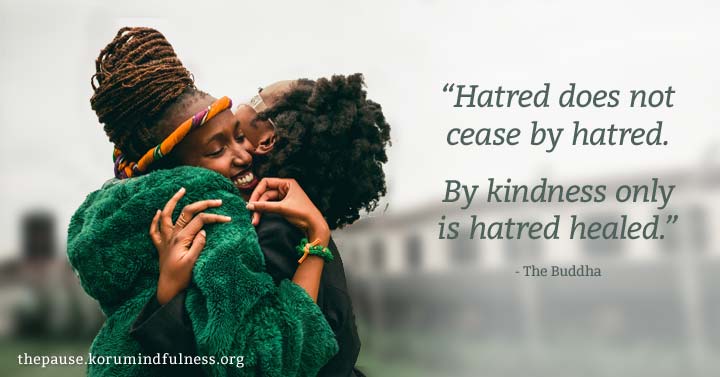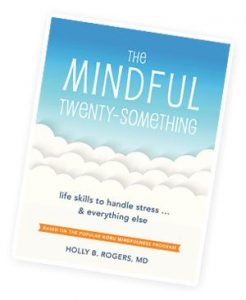
If you were holding a hot coal in your hand, and you could feel it burning your flesh, what would you do?
Stupid question. You would drop it, of course. As quickly as possible, without even thinking.
Have you noticed though, that you don’t do the same thing with painful or destructive emotions? Particularly anger and hatred. There’s something sort of attractive about those feelings; we tend to nurse and cling to them.
Emotions that Burn
Not too long ago I was uncharacteristically and intensely furious with someone. It’s best to leave the details out, but let’s just say I was filled with wrath and self-righteous indignation in response to another person’s behavior. I hadn’t felt this intensity of anger in a very long time.
My anger was making me suffer. I couldn’t sleep or concentrate. I was irritable and unhappy.
I could see the intensity of the anger, and I could tell that it was making me suffer, but there was part of me that wanted to hang on to it. It was satisfying in a way. I wanted to nurse it, to blow on it, to make it burn brighter instead of letting it go.
My anger was like a hot coal, burning my heart, but instead of dropping it, I clung to it.
Kindness is the Antidote
Of course, I knew how to drop the coal, or at least how to begin the process. One of the things you come to understand very well as you practice mindfulness is how to work with painful emotions.
The trick is to shift your awareness away from the thoughts about the situation, rather than following the temptation to wallow in the intensity of the strong feelings. This of course is not easy to do. To make it happen, you have to actively work to cultivate different thoughts and feelings.
As the Buddha said:
“Hatred does not cease by hatred. By kindness only is hatred healed. This is an eternal law.”
Wow. An eternal law. Pretty serious stuff. But in my experience, this is a true fact. If I want to get rid of hatred, I can’t just wade around in that muck. Seeking revenge by doing vengeful and hateful things, or ruminating about doing vengeful or hateful things, just keeps the hatred flowing.
Kindness indeed is the antidote, but that is a big ask. It is darn near impossible to be kind to someone you are furious at.
Fortunately, you don’t have to. You just have to be kind to yourself.
Cultivating Kindness: Start with Awareness
Here’s a strategy:
- First, get very curious about how hatred and anger feel. Drop your awareness into your body and see what you notice. Notice the tightness and constriction, notice the irritability and tension. Notice the way the emotion wants to direct your thoughts in the same rut, spinning your wheels, digging you deeper into the muck.
- Use the awareness of the toxicity to fuel the willingness to cultivate a different state of mind. It takes energy and effort to shift the path of anger. Work on your willingness to do that by reflecting on how much nicer it feels to have peace of mind.
- Distract yourself from the anger and actively cultivate a different state of mind. Bring your awareness to goodness in your life. Think of the kindest thing you could do for yourself, and do it. Think of something kind you could do for someone else, and do that too. Think about things you are grateful for and reflect on happy experiences.
- In meditation practice, use meditations that very actively engage your mind to keep yourself anchored in the present moment. Try a gatha, a meditation poem that helps anchor your attention. Or use a loving-kindness meditation to cultivate more positive perspectives.
Want to see more Koru teachers working in under-served communities? So do we! Help us reach this goal by donating to our scholarship fund!
Dropping the Hot Coal
Another Buddha quote came to mind when I was in the midst of my personal storm of anger and hatred:
“What the mind reflects upon in a sustained way, to this our mind will bend and incline.”
I didn’t want my mind to bend and incline towards hatred and revenge, because it made me suffer. I wanted my mind to incline towards contentment and satisfaction and joy. So, I reflected on those feelings in a sustained way.
I began to cultivate gratitude, by intentionally bringing my awareness to aspects of my life that are positive and satisfying. I went out of my way to do acts of kindness for other people. I used my meditation practice to calm my mind and stay anchored in the present moment.
All of these things helped me diminish the toxic effects of my anger. Eventually, I was able to drop the hot coal and the burn faded away. I was grateful that my mindfulness practice helped me to do this before I acted in ways that I would have surely regretted, extending my own suffering and causing unnecessary suffering for others.
Have you used mindfulness to overcome anger and hatred? Share your story below .
Photo by Shalom Mwenesi on Unsplash
Get our latest articles in your inbox.
